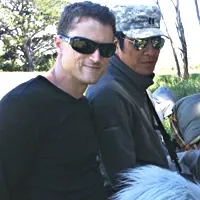Korean Filmmaking Lessons
Written by

Foreign film crews in New Zealand offer local crews a chance to adapt and improve their own skills and methods. When the South Korean drama Athena came down under, Ande Schurr was there to learn some new tricks.
* * *
The South Koreans are fascinating people to work with. They have an understanding of 'each in their rightful place' without it being about the abuse of power or egos. On Athena, the South Korean drama I've just finished working on, I saw production assists and movie stars bowing to each other - displaying a mutual regard.
With great respect to our own Kiwi culture and methods, that have made us so cutting edge and innovative, I thought it would be interesting to make some general comments on my experiences during the past week. Perhaps we can learn something from them.
Athena is a very popular Korean drama series that includes New Zealand as a scripted location for an incident that happens with the main characters. The Korean production brought all HOD crew from Korea but another 21 kiwis were hired, thanks to production manager Lisa Kissin, to assist with each respective department; thus I boomed and assisted the sound recordist who didn't speak a word of English.
We filmed in many locations from graveyards to sheep farms, schools to Piha beach, and as the week played out I was able to focus my vision from "they do everything differently" to "they just do some things differently". Allow me to explain.
1. Emotions
While kiwis are cool, calm and collected, the Koreans can be excitable and emotional in their movie making. They will suddenly launch into a fast paced tirade of excited chatter or deliver a burst of sharp instructions to each other. In this spontaneous expression I see that they really understand that the job is about the job and whatever is needed to get the job done.
2. Diplomacy
We kiwis are masters of diplomacy. We will coat our instructions with honeyed phrases in order to prevent others taking our words the wrong way. It is interesting to see the different approaches to achieving harmony on set. The Koreans are blunt and sharp yet there is never any malice hidden in what they say. It could be described as a purer form of efficiency.
3. Respect
Everyone bows. There is a communal feeling within the Koreans. Touching is given another angle too - one thing stuck in my mind, a Korean guy was sitting next to a kiwi explaining the next setup by drawing on the kiwi's leg. I had a little chuckle because I thought how carefully we defend our personal boundaries in New Zealand but here was a gesture, completely professional, that just seemed right somehow but would make others squirm!
4. Pace
The Koreans "go like the clappers" as old Mrs Peach, my childhood piano teacher would say. They work so fast and relocate with so little fluffing around that whole scenes are digested in minutes where it may take hours normally. I remember Heong, my Sound HOD, telling me through a translator that the big budget movies that he works on are routinely shot in two-three weeks in Korea. However, there is an excellent reason worth noting for how this speed, without compromising quality, is achieved. I learned that there is a lot of discussion until late at night before the next day's shoot. Then, the following morning, another lengthy discussion about the shots take place. While the kiwi crew are waiting about wondering if the day's shooting will ever get going, the Korean crew are continuing to discuss the shots (as they in turn wait on makeup and wardrobe for the actors). It's an interesting dichotomy yet explains why they can work so fast when they do start.
We need more international crews come to New Zealand so we can see other ways of working and achieving the same result. Respect for a culture comes when you understand the reason things are done differently. If the goal of film-making is to make a film in as short a time as possible while getting the best performances and shots, then the Koreans have something to teach us.